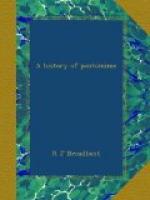Again, Gherardi: “Anyone may learn a part by rote, and do something bad, or indifferent, on another theatre. With us the affair is quite otherwise; and when an Italian actor dies, it is with infinite difficulty that we can supply his place. An Italian actor learns nothing by head; he looks on the subject for a moment before he comes forward on the stage, and entirely depends upon his imagination for the rest. The actor who is accustomed merely to recite what he has been taught is so completely occupied by his memory, that he appears to stand, as it were, unconnected either with the audience or his companions; he is so impatient to deliver himself of the burthen he is carrying that he trembles like a schoolboy, or is as senseless as an echo, and could never speak if others had not spoken before. Such a tutored actor among us would be like a paralytic arm to a body: an unserviceable member, only fatiguing the healthy action of the sound parts.”
CHAPTER XII.
Pantomimical Characters—Neapolitan Pantomime—The Harlequin Family—The Original Characters in the Italian Pantomimes—Celebrated Harlequins—Italian and French Harlequins—A French view of the English Clown—Pierrots’ origin—Pantaloon, how the name has been derived—Columbine—Marionette and Puppet Shows.
After having shown what the Lazzi and Extemporal Comedies were like, let us now turn to the Pantomimical characters associated with their representations.
Every one, observes Mr. Isaac Disraeli, of this grotesque family were the creatures of national genius, chosen by the people for themselves. Italy, both ancient and modern, exhibits a gesticulating people of comedians, and the same comic genius characterised the nation through all its revolutions, as well as the individual through all his fortunes. The lower classes still betray their aptitude in that vivid humour, where the action is suited to the word—silent gestures sometimes expressing whole sentences. They can tell a story, and even raise the passions, without opening their lips. No nation in modern Europe possesses so keen a relish for the burlesque, insomuch as to show a class of unrivalled poems, which are distinguished by the very title; and perhaps there never was an Italian in a foreign country, however deep in trouble, but would drop all remembrance of his sorrows, should one of his countrymen present himself with the paraphernalia of Punch at the corner of a street. I was acquainted with an Italian, a philosopher and a man of fortune, residing in this country, who found so lively a pleasure in performing Punchinello’s little comedy, that, for this purpose, with considerable expense and curiosity, he had his wooden company, in all their costume, sent over from his native place. The shrill squeak of the tin whistle had the same comic effect on him as the notes of the Ranz des Vaches have in awakening the tenderness of domestic emotions in the




